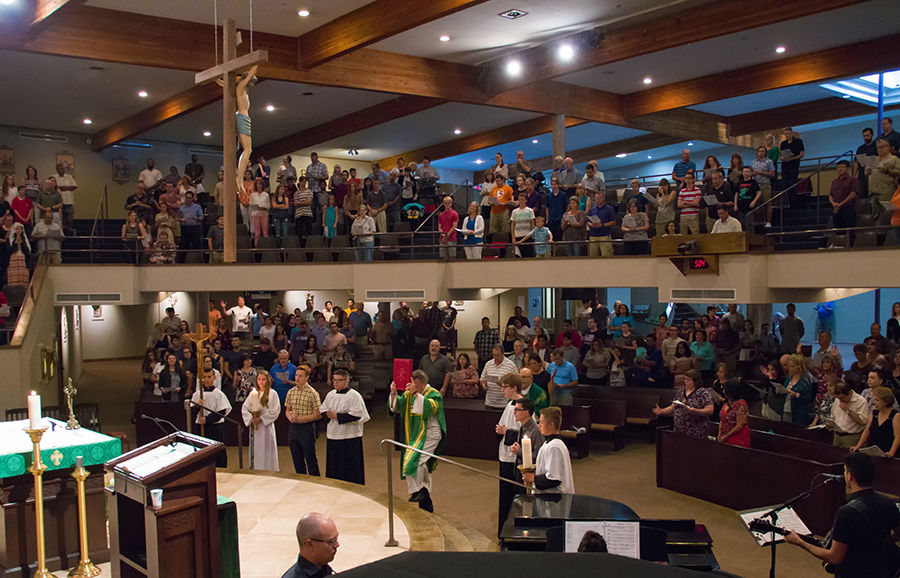As we wind down to the end of this liturgical year — the final Sunday being Nov. 26, the feast of Christ the King — here is a checklist of some simple ways of improving parish liturgy that might serve as an agenda for your liturgy committee in the new Church year, which begins the First Sunday of Advent, Dec. 3.
Let’s focus first on the Gathering Rites.
1. Daily we are bombarded with sounds, images and excessive information. It can be very difficult to turn it all off inside our heads when it comes time to be at Mass. We may need an extended period of quiet time to help us prepare to more fully, consciously and actively participate in the liturgy, both internally and externally.
What can we do to help make that transition from the frenetic pace of everyday life to the reflective and transcendent world of prayer and worship?
Consider this: invite Mass-goers to come to church early on Sundays. Provide the opportunity for social gathering of people. Then, at a pre-determined and agreed upon time, play soft, meditative instrumental music and invite everyone in church to join in a short period of personal mediation to prepare their hearts and minds. “Be still, and know that I am God.” (Psalm 46:10) The parish liturgy committee could run a regular notice in the bulletin, as well as offer a regular announcement before and after Mass, inviting everyone to this time of mediation. It sounds like an awkward or unlikely possibility, but don’t give up too easily. It may take a few years before it becomes a regular parish practice. And the fruits of your labor will grow good things in your parish, and in the lives of all its members.
2. Always choose a song of praise for the opening that is familiar to most of the assembly, so that they will sing with exuberance and from the heart. Be sure to sing all the verses. It takes time to find our way to the unity to which we are called.
3. Pace the opening procession slowly. This procession moves us all together into a time set apart from regular life, a sacred place and time where we stand in the presence of the transcendent God together. Don’t reduce the movement and song to just what is necessary. Surrender to the moment.
4. Be sure the deacon/lector carries the Gospel Book with reverence in the opening procession and places it prayerfully and deliberately on the altar.
5. Let the presider’s first words be the scriptural greeting designated in the Roman Missal. Let those words ring true and strong, placing us in the context of God’s Word right from the start.
6. Allow time for silence before and during the penitential rite so that everyone can rest in the mercy of God. Often, we fill the liturgy with too many words!
7. Sing a Glory to God that is well known by the assembly. Don’t let this moment be a performance by the parish musicians. All of the assembly participates in this song of glory. Be sure that parish musicians are well trained and understand that throughout the Mass they are leading song that is ritual prayer and worship.
8. When the presider invites us into the Collect with the words: “Let us pray,” the ritual rightly calls for silence to follow. Often the presider advances too quickly into the opening prayer without allowing time for the whole assembly to unite in silent prayer first. That “Let us pray” invitation by the presider happens three times in the Mass: The Opening Prayer/Collect, the Prayer Over the Gifts and the Prayer After Communion. Each “Let us pray” needs to be followed by a full moment of silent prayer so that everyone present may become one in heart and mind first, before the presider uses a few spoken words as representative of the strength and power of our internal prayer. Following our “Amen” that closes and affirms our oneness, all are seated and prepare their minds and hearts for the proclamation of God’s presence in the Word.
Every moment of our Gathering Rites needs to be paced slowly and deliberately so that when the rites are completed, Christ’s presence has been revealed in and through the assembly as one body.
“For in the celebration of Mass, in which the sacrifice of the cross is perpetuated, Christ is really present in the very assembly gathered in his name, in the person of the minister, in his word, and indeed substantially and uninterruptedly under the Eucharistic species.” (General Instruction of the Roman Missal No. 27)

